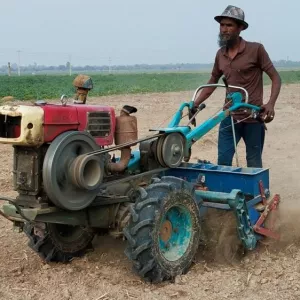The role of direct-seeded rice in promoting sustainable agriculture and improving the livelihood of Bangladeshi farmers
(Photo: DSR sowing of seeds at Mr. Kamal’s plot) Muhammad Ashraful Habib*, Swati Nayak*, Nuruzzaman*, Saidul Islam*, and Amaresh Chandel** Amidst the challenges surrounding the agriculture sector, such as water scarcity, greenhouse gas emissions, and climate change, innovations like direct-seeded rice (DSR) offer hope. The rainfall deficit has compelled farmers to rely heavily on deep wells for irrigation, exacerbating the

The role of direct-seeded rice in promoting sustainable agriculture and improving the livelihood of Bangladeshi farmers
(Photo: DSR sowing of seeds at Mr. Kamal’s plot)
Muhammad Ashraful Habib*, Swati Nayak*, Nuruzzaman*, Saidul Islam*, and Amaresh Chandel**
Amidst the challenges surrounding the agriculture sector, such as water scarcity, greenhouse gas emissions, and climate change, innovations like direct-seeded rice (DSR) offer hope.
The rainfall deficit has compelled farmers to rely heavily on deep wells for irrigation, exacerbating the already significant strain on the dwindling groundwater supplies. The Bangladesh Water Development Board reported that the groundwater level is declining by approximately 50.8 cm per year, particularly in the country’s northern region. In response to this challenge, the adoption of DSR in the Rajshahi has shown promising results.
DSR is an innovative crop establishment technique in which rice seeds are directly planted in the field instead of growing seedlings in a nursery and then transplanting them in the field. In modern agriculture, this technique is one of the most effective and financially feasible ways to produce rice.
Farmers in Rangpur and Rajshahi in the northern parts of Bangladesh are at the forefront of this y shift towards revolutionary techniques that improve food security, address labor shortages, and ensure sustainable agriculture. Farmers are using DSR to transform rice cultivation into a more productive and sustainable endeavor. There is no denying the proven importance of DSR in reducing the negative impacts of climate change and safeguarding food security.
Technological inclusion and enhancement of capacity
Through interventions of the ScaleDirect Project in Bangladesh, various DSR trainings for farmers are being organized. The initiative, focusing on an integrated direct seed system, introduced a combination of varieties, mechanized direct seeding establishment, and better weed management practices to the farmers in Rajshahi District. The on-farm testing organized in…

